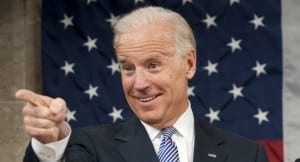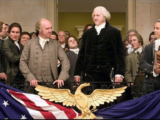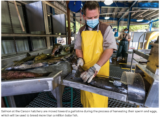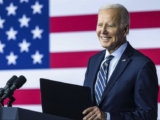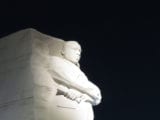By Nicholas Sheppard –
John Adams once described the vice-presidency as “The most insignificant office that ever the invention of man contrived.”
In the 1930s, John Garner went one further, famously describing the office as being “not worth a bucket of warm piss”.
Things have hardly gotten better since Garner’s time. Richard Nixon’s painfully wrought journey to the vice-presidential nomination, through the treacherous undercurrents of Republican politics, marks him out as the first modern vice-president. The demands of the position certainly led to a number of modern complications.
Dr. Arnold A. Hutschnecker, who for many years served as Nixon’s psychotherapist once said that Nixon ”didn’t have a serious psychiatric diagnosis” but had ”a good portion of neurotic symptoms,”
Hutschnecker thought Nixon was “an emotionally deprived child,” who grew up to become a “person who regarded love and physical closeness as a diversity that would drain him, deplete him, make him less manly. Love never had a priority in Nixon’s life, for he always convinced himself that he didn’t need to be loved as a human being, only respected as a man.”
A scandal over an alleged slush-fund that threatened Nixon’s vice-presidential nomination led, of course, to his famous Checkers speech. The moment he was off the air after that broadcast to the nation, and though he was apparently aware of the ‘cut’ signal, Nixon went on talking, walking forward, in a complete emotional daze, eventually bumping his shoulder into the head-on camera. A camera operator darted forward to catch Nixon. ‘I loused it up,’ he said to an aide, before turning to pick up his speech notes on the desk, stack them for a moment, then hurl them to the floor in disgust and step back to bury his face in the stage drapes.
And this stress was only to secure the nomination for vice president. When Nixon sought a second term, some of Eisenhower’s aides aimed to displace him. When Eisenhower announced his reelection bid in February 1956, he hedged on the choice of his running mate, stating that it was improper to address the question until he had been re-nominated.
At a press conference during the 1960 campaign, Eisenhower was asked to name a big idea Vice-President Nixon, who was then running for President, had offered during the administration. Eisenhower said, somewhat jokingly, ‘If you give me a week I might think of one, I don’t remember.’
In his debate with Kennedy, the first time such a televised event had taken place in America, Kennedy demanded a ban on candidates wearing make-up – then applied some anyway. He also made sure the studio was uncomfortably warm so that Nixon, who perspired easily, would sweat and look shifty. Nixon lost.
Shortly after his nomination as J.F.K’s running mate, Robert Kennedy, over a series of meetings, made a concerted effort to get Lyndon Johnson to withdraw from the ticket. Lyndon Johnson retained the nomination, but never forgot the humiliation.
There is footage of Johnson ‘socializing’ with his new running mate. Kennedy swims languidly while Johnson sits awkwardly pool-side, watching. Johnson, who, up till then, had been the most powerful Majority Leader in history, was stripped of power in the new administration. When Johnson presented a set of powers he wanted as vice-president, Kennedy rebuffed him. Says Robert Caro: “They mock him. They call him “Rufus Cornpone”. He and Lady Bird are referred to as Uncle Cornpone and his little pork chop. He’s ridiculed, humiliated and denied power for almost three years”.
Everything that Lyndon Johnson did had to be cleared. Every speech that he gave, no matter how minor. He couldn’t even use a government plane to go to an event unless Robert Kennedy signed off on it. He was dispatched to attend numerous funerals. Johnson would occasionally be invited, as a matter of protocol considerations, to formal dinners at Robert Kennedy’s house. Kennedy would always sit him at what was called “The Loser’s table”. And Johnson knew it was the Loser’s Table.
Between 1960 and 1966, Thomas Eagleton checked himself into hospital three times for physical and nervous exhaustion, twice receiving electroconvulsive therapy. He was also known to have suffered from depression. When these revelations emerged during the 1972 campaign, McGovern said he would back Eagleton, his vice-presidential running mate “1000 percent”. Subsequently, McGovern consulted confidentially with preeminent psychiatrists, including Eagleton’s own doctors, who advised him that a recurrence of Eagleton’s depression was possible and could endanger the country should Eagleton become president. On August the first, Eagleton withdrew at McGovern’s request.
Spiro Agnew was elected as Richard Nixon’s running mate in 1968. Despite his continued loyalty to the administration, Agnew’s relationship with Nixon deteriorated almost from the start of their political affiliation. Although Nixon initially liked and respected Agnew, as time progressed he felt his vice president lacked the intelligence and vision, particularly in foreign affairs, to sit in the Oval Office, and he began freezing Agnew out of the White House decision-making process. By 1970, Agnew was limited to seeing the president only during cabinet meetings or in the occasional and brief one-on-one, with Agnew given no opportunity to discuss much of substance.
Oval Office tapes reveal that in 1971, Nixon and his chief of staff, Bob Haldeman discussed their desire to have Agnew resign from office before the following year’s campaign season. Nixon would have liked to replace Agnew on the Republican ticket in 1972 with John Connally, his chosen successor for 1976, but he realized that Agnew’s large conservative base of supporters would be in an uproar, so he reluctantly kept him as his running mate. When John Ehrlichman, the President’s counsel and assistant, asked Nixon why he kept Agnew on the ticket in the 1972 election, Nixon replied that “No assassin in his right mind would kill me” because they would get Agnew (as President).
During his fifth year as Vice President, late in the summer of 1973, Agnew was investigated on charges of extortion, tax fraud, bribery, and conspiracy. Agnew was allowed to plead no contest to a single charge that he had failed to report $29,500 of income, with the condition that he resign the office of Vice President.
Nelson Rockefeller, Gerald Ford’s vice president, underwent extended hearings before Congress, suffering embarrassment when it was revealed he made massive gifts to senior aides, such as Henry Kissinger, and used his personal fortune to finance a scurrilous biography of a political opponent. He had not paid all his taxes, owing nearly one million dollars, but no illegalities were uncovered. Ford’s new White House staff had no intention of sharing power with the vice president and his staff, however.
Rockefeller’s attempt to take charge of domestic policy was thwarted by White House Chief of Staff Donald Rumsfeld, who objected to policy makers reporting to the president through the vice president. In November 1975, Rockefeller told Ford that he would not run for election as vice president in 1976, saying that he “didn’t come down to Washington to get caught up in party squabbles which only make it more difficult for the President in a very difficult time…”
As Vice President, George H. W. Bush chaired two special task forces, on deregulation and international drug smuggling, but generally took on a low profile, and attended a large number of state funerals, which became a common joke for comedians.
For his own presidential run in 1988, Bush’s nominated Dan Quayle as his running mate. In 1980, Quayle, then a congressman from Indiana, spent a golfing vacation in Florida with two Republican House colleagues, one of whom was accompanied by Paula Parkinson, a Washington lobbyist. Parkinson, the star of a November 1980 Playboy pictorial recalled, “We flirted a lot and danced extremely close and suggestively. He said he wanted to make love”. In Paula Parkinson’s words: “Washington is basically a very horny city”.
Quayle emerged from the scandal, due in part to the backhanded support of his wife: “Anybody who knows Dan Quayle, knows he’d rather play golf than have sex any day.” Quayle participated in the vice-presidential debate of October 1988, against Democratic candidate Lloyd Bentsen. When the subject of the debate turned to Quayle’s relatively limited experience in public life, he compared the length of his congressional service with that of former President John F. Kennedy. Bentsen’s put-down – “Senator, you’re no Jack Kennedy” – subsequently became a part of the political lexicon.
Throughout his time as vice president, Quayle was widely ridiculed in the media and by many in the general public, as an intellectual lightweight. Contributing greatly to the perception of Quayle’s incompetence was his tendency to make public statements that were either self-contradictory and confused (“The Holocaust was an obscene period in our nation’s history.… No, not our nation’s, but in World War II. I mean, we all lived in this century. I didn’t live in this century, but in this century’s history”), impossible and confused (“I have made good judgments in the past. I have made good judgments in the future”) or just confused, as when he addressed the United Negro College Fund, whose slogan is “A mind is a terrible thing to waste,” and said, “You take the UNCF model that what a waste it is to lose one’s mind or not to have a mind is being very wasteful. How true that is.”
His most famous blunder occurred when he altered 12-year old student William Figueroa’s correct spelling of “potato” to “potatoe” at a spelling bee in Trenton, New Jersey in 1992.
Al Gore, generally respected as vice president, declared ‘I am my own man’ at the outset of his bid for the presidency in 2000, but quickly found things difficult. The public was still angry about the Lewinsky affair, and had decided to take it out on him. His repeated sighing during the first presidential debate, and critiques in the media as either too stiff, too reticent, or too aggressive in contrast to Bush, were further contributing factors in his unsuccessful bid to succeed his boss.
Following 9/11, Dick Cheney was instrumental in providing a primary justification for the war against Iraq. Cheney helped shape Bush’s approach to the War on Terror, making numerous public statements alleging Iraq possessed weapons of mass destruction and continuing to allege links between Saddam Hussein and al-Qaeda even though there was no credible evidence.
Following the US invasion of Iraq, Cheney remained steadfast in his support of the war, stating that it would be an “enormous success story”. He often criticized war critics, calling them “opportunists” who were peddling “cynical and pernicious falsehoods” to gain political advantage while US soldiers died in Iraq.
In a 2008 interview on the fifth anniversary of the assault on Iraq, Cheney responded to a question about public opinion polls showing that Americans had lost confidence in the war by simply replying “So?” The remark prompted widespread criticism.
Media outlets questioned whether Cheney had created a “fourth branch of government” that was not subject to any laws. They also questioned Cheney’s influence on decisions pertaining to detention of suspected terrorists and the legal limits that apply to their questioning, especially what constitutes torture.
In the latter years of his vice presidency, Cheney became a recurring topic for satire. There was a shooting incident, when he was out hunting quail with a friend, multiple heart problems, and the amusingly macabre notion of three man-sized safes in his office. He departed office with approval ratings between 13% and 30%.
As I’ve stated in a previous article, Joe Biden‘s legislative involvement during the Obama administration reveals him to be a singularly influential vice-president.
In 2010, his direct negotiations with Senate Minority Leader Mitch McConnell were instrumental in producing the administration’s compromise tax package that revolved around a temporary extension of the Bush tax cuts. In 2011, Biden led negotiations between both houses of Congress and the White House in resolving federal spending levels for the rest of the year and to avoid a government shutdown. By May 2011, a “Biden panel” with six congressional members worked on a bipartisan deal to raise the U.S. debt ceiling as part of an overall deficit reduction plan. It was again Biden’s relationship with McConnell that proved to be a key factor in breaking the deadlock, in the form of the Budget Control Act of 2011. Biden had spent the most time bargaining with Congress on the debt question of anyone in the administration, and one Republican staffer said, “Biden’s the only guy with real negotiating authority, and McConnell knows that his word is good. He was key to the deal.”
In terms of heavy lifting when it comes to the domestic agenda of an administration, none of Biden’s predecessors come close. He is known, undeservedly, for his loose tongue and lack of discipline. He deserves more credit, as he might very well be the most successfully influential vice-president ever.
Republished with permission from The Sheppard Post.


